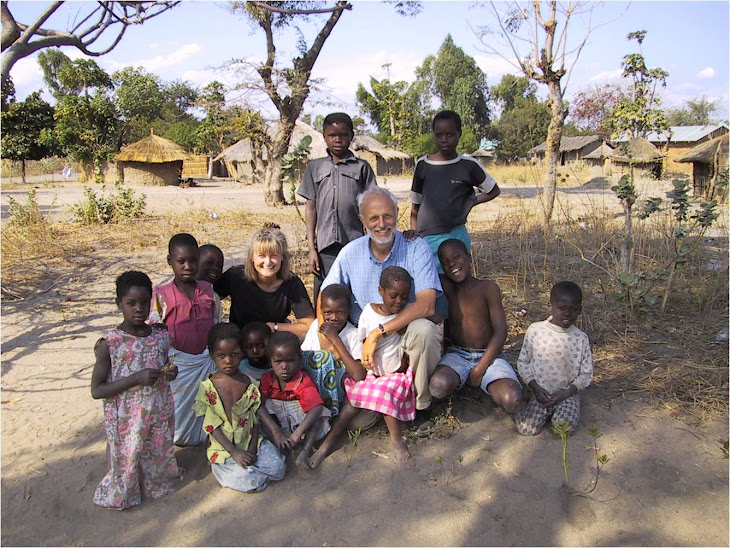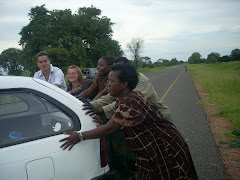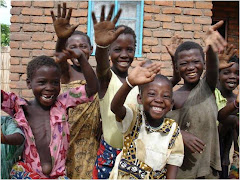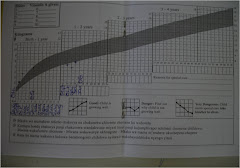A trip to Malawi requires an attitude adjustment, a different way of thinking. It happens when we start packing. You pack toilet paper, start saving sheets of paper only used on one side and Ruth says “save those zip lock plastic bags-they are a premium now”
Malawi is known as the “Warm Heart of Africa” for the friendliness of the people. It is also in the “have not” part of the planet, 5th from the bottom in world poverty. Out and away from the two major cities, it is pure subsistence. You grow it, raise it or catch it, or you don’t eat. Your house is made of materials from the land next door: mud dried bricks, bamboo roofing poles and grass on the roof
We try to pack accordingly: one suitcase for the both of us for a one month visit. We bring several “luxury item” beyond toilet paper, bath soap, small laptop, a good pair of binoculars, and a few medical supplies. And you know what, we have more than we need and we live very well. It forces one of life’s major questions, “how much is enough”? The answer: a heck of a lot less of what we have in Anchorage, and a lot more than what the villagers have in Malawi.
With several of our Malawian colleagues and friends, we met with 37 HIV positive folks yesterday (Sunday) in a support group in a nearby village. All were on adequate HIV medicines. We asked what they were most worried about. The answer was immediate. ….enough food to eat and for the women also a dry roof to sleep under because most of their husbands had died from the complications of HIVAIDS.
For Ruth and I our trip to Malawi is like hitting the reset button. The more fundamental issues in life pop back into focus. For a month we are in the offline mode both literally and figuratively.
First you take an electronic holiday –cell phones don’t ring; the internet does not work; or is so sloooow that you wish it didn’t work, forget about TV and the two small national papers are devoid of news from the United States. At home I am a news junkie. But after about three days of withdrawal, you realize you are more relaxed, the pace is slowed and you are hearing more birds singing the early morning.
And then there is the interesting part about entering a different world reality that puts your Alaska life offline. It is hard to explain. The immediacy of the daily mini crises at home with work, in the family and with friends are set aside and fade from memory. They are replaced here with others and usually more basic issues among our friends, neighbors and folks who approach us during our daily activities: enough food to eat, clean water to drink, a thatched roof that does not leak, clothes to wear. It is a great mind adjuster.
It is just a different reality. Some of the life’s major issues are the same: Death of loved ones, serious illness, wayward teenagers and always a concern about no money. Even in a subsistence culture some money is needed: tea, sugar, school fees for kids going to secondary school, money for transport for going to the hospital. And the social ills of any society are all pretty much the same: jealously of what your neighbor has, rumor mongering, infidelity, alcoholism. The longer that Ruth and I are here, the more sameness we see; not the differences.
You don’t romanticize. For Malawians life is tough. There is no social safety net. You and your village are on your own. To the extent that institutional support is available, it comes from the churches and mosques (also very poor), and the various NGO’s (non governmental organizations = non profits) scattered throughout the country.
So how can you and we help? Here is what we have been learning over the years. Most of our ideas of what should be done, don’t work. It takes local knowledge, leadership and commitment to make a difference.
Here is how you have to adjust your thinking: The country was out of petrol. Even the police and the military did not have any. Zambian petrol trucks were supplying all the petrol to landlocked Malawi and Zambia ran out of truck tires. Ah, the locals say “this is Malawi” and get on with their work as best they can. Donated equipment from good-hearted foreigners, everything from office copiers, vehicles, laboratory equipment, water pumps, desperately needed and do make a contribution until they break. There are no replacement parts, and for the more sophisticated items, no one to fix them even if the parts were available. The mantra that you hear about simple and appropriate technology for this part of the world is spot on.
And Malawians are very resourceful. Equipment simply designed using easily available materials are ideal. Malawians will make sure they work and keep them running. Take for example the Mangochi (where we live) equivalent of “duck tape”. In the market and at multiple places along the roadway, we were seeing what looked like smoked strips of meat, except they were longer and blacker (inch wide and three to four feet long). It is the inside cord striped from used car tires. Tie links together and it is used for rope; peel off individual several strands, and it ties together the bamboo uses make your roof; peel off just one strand and use it to hang jewelry around your neck. The rest of the tire , cut , shaped and used for the soles of your shoes. They have made recycling into a science.
So again the question is how can you help? The guiding principle has to be “local solutions for local problems”. As an outsider the problems are easy to identify and too often in the past, we all thought we had the workable solution. Not true. The local folks have to puzzle it out, and we have to listen. They know what will work and not work.
A second and just as important thought is most of the significant problems out here do not exist in isolation. One cannot tackle just one social issue. They don’t exist in isolation. To tackle one, you must work on the others also. It is a jigsaw puzzle. All the pieces must be found and fit, before the picture is complete.
The Malawi Children’s Village (MCV) is a good example. It is Malawian designed and owned. This mission is simple. Give the HIVAIDS orphans in the 36 villages that surround the little campus, the same or even better chance at life, as if they had their own parents. In reality it is a community development program focused on orphans.
For these kids, it is not just providing an opportunity to go to a good school. It also means enough food to eat, a dry roof to sleep under, clothes to wear, and a place to go if you get sick. Hopefully living with a guardian or grandparent who would provide the love and stability your parents would have. It takes a village to raise a child!
The response from MCV over the past 12 years has been comprehensive: village irrigation projects; the Anchorage school to school program to beef up the village primary schools; an in house vocational training and secondary school; supplying clothes and blankets and housing repairs; a bed net program for children under five establishing village based MCV volunteers who independently watch out for the welfare of the orphans in their village. These efforts have benefited the whole village. The village improves; the life of the orphans in the villages rises with the tide.
The results have been remarkable. Ten of the top students in this year’s senior class of 80 are orphans. Several of the orphans from earlier in the program are now teaching in the secondary school. The bed net program has dramatically reduced the rate of Malaria. Primary schools have desks, paper and pencils. Last years graduation class had the second highest pass rate on the national exams among the 10 secondary schools in this district.
You have made this happen! And your contributions go far. The USA Malawi Board is completely volunteer. There is no paid staff. Our reasons to come to Malawi include making sure the contributions that we send over are spent appropriately. This trip our focus is on sustainability.
Malawi and MCV are a wonderful, confusing, complicated, and satisfying place to volunteer. It does reset you priorities and we feel privileged to be able to work and participate in this part of the world.
Thursday, March 4, 2010
Subscribe to:
Post Comments (Atom)







It is so easy to forget what is really important to survive and thrive. This reminds me once again.
ReplyDelete